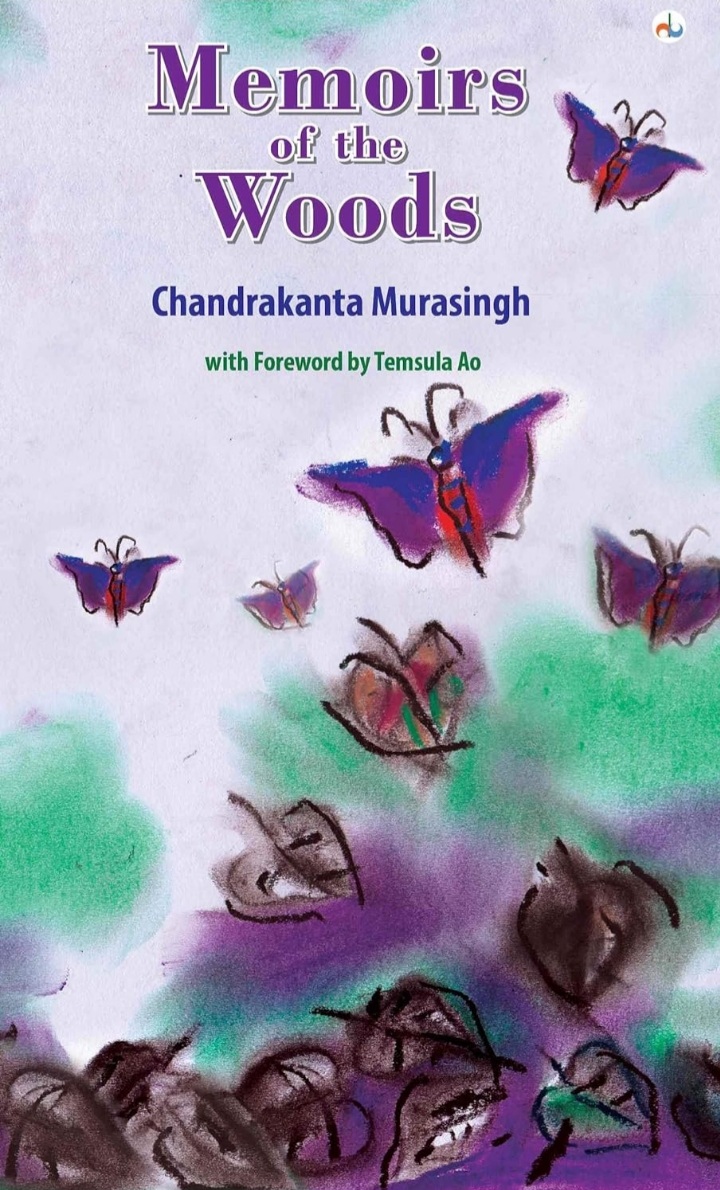Book review by Oudarjya Pramanik
In the contemplative realm of literature, one often encounters works that evoke a profound connection between the written word and the recesses of one’s memory. As I delved into the pages of this remarkable book, a myriad of personal thoughts and reminiscences unfolded in my mind. It was a return to a time, not so distant, when I was pursuing my postgraduate studies in the hallowed halls of the University of Calcutta, immersed in the department of Comparative Indian Language and Literature.
It was in those academic chambers that I first encountered the name Chandrakanta Murasingh, a luminary whose legacy now weaves through the tapestry of Kokborok literature. Dr. Mrinmoy Pramanick’s classroom introduced me to the enchanting world of this unique language, and today, my heart aches as we mourn the recent loss of this ‘Kokborok’ Sahitya Akademi Bhasha Samman awardee, a man whose brilliance and contribution to the literary world remain irreplaceable.
Dr. Mrinmoy Pramanick’s recent endeavour to translate this book into Bangla holds promise as it prepares to venture into uncharted literary territories. The eagerly awaited translated version is the result of a collaborative translation effort, in which I had the privilege of participating, helping me to review the book more effectively.
“Memoirs of the Woods” emerges as a literary milestone, possibly the first Kokborok anthology translated into English by Saroj Chaudhuri. It presents a collection of 57 poems that encapsulate the essence of Chandrakanta Murasingh’s prolific journey. This anthology, spanning 72 pages, not only unveils the richness of Kokborok literature but also opens a window into a world where linguistic and cultural boundaries are transcended. Saroj Chaudhuri’s translation has the power to introduce a global audience to the unique literary heritage of the Kokborok-speaking community. Through this remarkable work, we witness the transformative and unifying potential of literature, as it connects people from diverse backgrounds, forging a shared appreciation of human creativity. “Memoirs of the Woods” is a testament to the enduring power of words, transcending time, language, and cultural divides to create a vibrant tapestry of literary expression. Thus, Temsula Ao, in the forward of the book, writes, “Writing a Foreword for a collection of Selected Poems from seven books of a prolific writer like Chandrakanta Murasingh spanning more than thirty years is indeed a daunting task. The passage of years signifies not merely the chronological shifts in perspectives but also the intellectual and psychological landmarks in the poetic journey.”
The history of Kokborok poetry in Tripura is a poignant narrative of struggle and resilience, where a language fought for official recognition, often overshadowed and neglected. This journey, fraught with hardship, was irrevocably altered with the emergence of Kokborok poetry in written form, a recent chapter catalysed by the mass education movement and the birth of the “Jansikhsha Samiti” in 1945. Visionaries like Mahendra Debbarma, Ramthakur Debbarma, Jogendra Debbarma, and others, who formed this association, played an instrumental role in shaping Kokborok literature.
A pivotal moment occurred in 1954 when the Jan Shiksha Samiti members published “Kutal Kathama,” marking the official commencement of Kokborok poetry in Tripura. Yet, we must not forget that Kokborok poetry’s roots run deep within oral traditions, entwined with folk songs and poetry. These expressions, rooted in tribal life and their harmonious coexistence with nature, are a treasure trove of myths, rituals, and legends connected to the natural world.
Chandrakanta Murasingh underscores the need to delve into these folk songs and oral poetry when studying Kokborok poetry, for they are the repositories of tribal ethos, celebrating local landscapes and the cyclic rhythms of nature.
Kokborok poetry, therefore, immerses itself in the vibrant tapestry of folk songs and oral poetry, embodying the inseparable bond between nature and the indigenous communities dwelling in this enchanting landscape. It pays homage to the enduring traditions of these people, ensuring that their cultural heritage flourishes through the power of verse.
This volume of poems encapsulates several profound thematic currents. One recurring thread is the pervasive sense of loss and the looming shadow of violence, at times engulfing the very essence of the region. Chandrakanta Murasingh is dedicated to documenting the hardships of contemporary life in Tripura, a land marked by the disconcerting presence of both extremists and the Indian Army.
Another prevalent theme is the gradual erosion of the traditional and innocent way of life that once defined this region. There’s a palpable disillusionment with India’s political system after six decades of independence, and this serves as the muse for satirical poems such as ‘Of A Minister’. These poems also grapple with universal dilemmas, posing existential questions that resonate on a subconscious level with modern individuals. They inquire into the meaning and purpose of life, provoking introspection.
The underlying premise is that while the northeastern states of India may still be in the process of integrating politically and socially with the rest of the country, the integration has undeniably begun. Poets who have composed works after 1950 have become the voices of their people, addressing issues that resonate not only with their region but also with mainstream India.
Historically and politically, the northeastern states were isolated from the rest of India for a considerable period. Even after the initial decades of independence, this region remained largely untouched by the modern trends of development that were transforming urban and rural India. The problem of violence, disruptive to the social fabric of the northeast, is a consequence of feeling neglected and excluded from the developmental process.
Ironically, movements led by militant groups claim to fight for the legitimate rights and independence of the people, yet their actions have led to the loss of freedom, peace, and the erosion of traditional culture.
Among the poems that I had the honour of translating into Bangla, “Liberated Sons of Manu” emerges as a powerful testament to the intricate nature of freedom and its far-reaching consequences. This poem resonates with the overarching themes of liberty, violence, and societal challenges previously discussed. It paints a vivid portrait of the forest of Chhamanu as a so-called “liberated zone.” However, within this veneer of freedom, the poem takes a plunge into the unsettling reality of unchecked power and its ramifications. The verses within “Liberated Sons of Manu” bring to light how this newfound freedom can be easily manipulated and exploited, with both “Tree’ terrorists” and “security forces” taking advantage of their newfound liberties. The poem meticulously underscores the profound ambiguity and contradictions embedded in the very concept of freedom. The repeated use of the term “free” in various contexts serves to emphasise this intricate tapestry of paradoxes that surround the idea of liberty. In its closing lines, “My obeisance to you, To the liberated sons of Manu,” the poem leaves us with a poignant reflection. It serves as a contemplative piece, forcing us to confront the complexities and challenges entailed in the quest for true freedom. It serves as a reminder of the imperative need for a responsible and principled exercise of freedom within society, echoing the timeless struggle to strike a balance between liberty and its potential for chaos and abuse.
The book’s title, “The Memoirs of the Woods,” draws from a poem that initially brims with optimism, depicting the vibrant and symbiotic relationship between nature and tribal communities. However, the poem takes a sombre turn, revealing the harsh realities faced by individuals, symbolising the challenges of sustenance and survival in this environment. It conveys a sense of suffocation and hardship, possibly symbolised by the sunset and its afflicted eyes.
Translators, often unsung heroes, play a pivotal role in this process, facilitating the exchange of language and culture. Sujit Mukherjee rightly observes that English, once foreign, has become domesticated in India, serving not only as a medium for translation but also as a canvas for creative expression. This evolution highlights the versatility of English as a tool for artistic communication.
The challenge deepens when we consider that these poems have been gracefully translated into English from the poet’s native language, Kokborok. The act of translation, a process rife with nuance and the art of preserving the essence of the original work, elevates this task to monumental proportions. Saroj Chaudhuri’s translation of “Memoirs of the Woods” is a commendable contribution to the literary world. Her role as a translator bridges the chasm between languages and cultures, making the rich tradition of Kokborok literature accessible to a wider audience This cultural exchange not only deepens our appreciation for India’s diverse cultures but also amplifies the voices of marginalised communities. Saroj Chaudhuri’s work stands as a testament to literature’s power to transcend boundaries and connect people from different backgrounds through the written word. It enriches the global literary landscape and bolsters the Indian literary canon by introducing Kokborok literature to us, a testament to the universality of literature and the power of translation to unite us all in the pursuit of knowledge and understanding.
Also, read “BOOK REVIEW OF RAMESH KARTHIK NAYAK’S CHAKMAK— OWSHNIK GHOSH” and Published in The Antonym:
Book review of Ramesh Karthik Nayak’s Chakmak— Owshnik Ghosh
Follow The Antonym’s Facebook page and Instagram account for more content and interesting updates.



























0 Comments